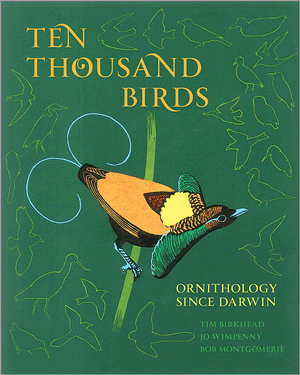 This is a wonderful book. It might not appeal to everybody but it is right up my street and it will be a book to which I return, often, over many years.
This is a wonderful book. It might not appeal to everybody but it is right up my street and it will be a book to which I return, often, over many years.
It’s about the study of birds, and the contribution made by ornithologists (and birds!) to our understanding of evolution, population regulation, sexual selection, migration, animal behaviour and a variety of other subjects.
Not only is Robert Gillmor’s cover very beautiful but the book is superbly illustrated throughout. There is artwork by Ralph Steadman, Robert Bateman, William Matthew Hart, Raymond Harris Ching and others.
There is not a graph or table in the book (that I can find) and that must have been a conscious decision to explain the history of thinking, and the outcomes of scientific disputes, rather than go into the details of the arguments. It’s a good decision – the references are there to send you to the details if you wish to engage with them.
Each chapter has a timeline which picks out the important events – often publications – which define the progress made in coming to our current position of understanding of the subject. These are very clear and very useful.
Throughout the book, there are accounts by (surviving) major players in ornithology of how they became interested in birds and the way they have tackled their studies of birds. These are very good – I liked them a lot. Some of the people given this treatment are friends of mine, others are people I know, some are people whose papers I have read and a few are new to me completely. This approach gave the book a very human feel. The greatest ornithologists are still people – and this book brought out their humanity.
I found the chapter on population studies of birds most fascinating. Here you will find an account of the battle of ideas between Aberdeen professor Vero Copner Wynne-Edwards and Oxford professor David Lack. This was largely played out in the 1960s and the 1970s, and so when I graduated in the late 1970s it was a battle of ideas that was resolved but still had some walking wounded. It is fascinating to read about the protagonists and their interactions and to learn some more details of the civilised way in which this scientific debate took place. And there is much of interest here about the grouse studies by Adam Watson, Robert Moss, Peter Hudson and others which went on into the 1980s.
If you read this book you will learn about birds – and birds are wonderful creatures! You will learn about the way the natural world works – and how birds have helped us to understand that (and that is worth knowing). And you will learn about the people, the mostly rather pleasant people, the ornithologists, who have shared a love of birds and disclosed the workings of nature to us. Birds are amazing! Ornithologists aren’t bad either.
It’s difficult to write about the history of ideas in an engaging way but the authors have carried it off very well. The future, to my mind, should always occupy us more than the past, because our actions determine the future and we are simply handed the past. But an understanding of the past, and a sympathy for it, better equips us for the future. This book is a perfect guide to how our thinking arrived at this point – and that’s important. But not only is this book important, it is also fun and entertaining.
Ten Thousand Birds is published by Princeton University Press and is available on Amazon, as is Fighting for Birds by Mark Avery.
[registration_form]
I wonder if the book contains any anecdotes on Professor Vero Copner Wynne-Edwards’ championing of the use of clam-shell or clap nets to capture incubating oystercatchers – by his Culterty Field Station-based Aberdeen university students during the field element of their bird population studies at the Sands of Forvie NNR.
My father and I came across a disgraceful scene there one May day in the late-1960s. We found an oystercatcher in such a net, flapping and struggling in its attempts to escape, covered in the contents of its now smashed 3 eggs. I have never seen my father so angry. After releasing the bedraggled bird, and ensuring it hadn’t damaged its flight feathers, he hurled the vile trap as far as he could into the River Ythan, using words that I, as a schoolboy at the time, had not yet encountered. Luckily the culprit was nowhere to be seen – perhaps wisely keeping low!
In the subsequent acrimonious follow-up telephone call we were fobbed off with the response that “….well, the oystercatcher is very common in the area, so no harm done…..”
I still have my father’s super 8mm cine film of the scene somewhere.
Mark, would you consider mentioning the Natural History Bookshop, when you plug your weekly book? NHBS, based in Devon has an ethical policy in contrast to Amazon and supplies specialist and otherwise unavailable tomes to a world wide audience. It could do with some support in order to offer the huge range of specialist titles which a cherry picker like Amazon will never do.